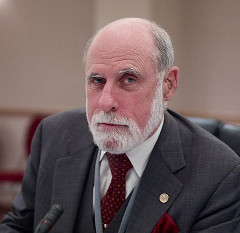Vint Cerf: we will keep the Internet free and open!
 Since 1973, when my colleagues and I started working on the technologies underlying the Internet, we advocated open standards for integrating computers. Not only for philosophical reasons, but also for practical ones.
Since 1973, when my colleagues and I started working on the technologies underlying the Internet, we advocated open standards for integrating computers. Not only for philosophical reasons, but also for practical ones.We developed protocols so that the Internet remains non-proprietary and open to interaction. These protocols avoided any bindings and locks, allowed anyone to contribute to the development of the network. It is because of this openness that the Internet now has such tremendous value. Since he has no boundaries and belongs to everyone, he gives unprecedented freedoms to billions of people: the freedom to create and invent, organize and influence, speak and be heard.
But after a few hours in Dubai, a meeting behind closed doors begins, during which governments will discuss Internet regulation. The International Telecommunication Union (ITU) from December 3 to 14 holds a conference to revise the treaty of 1988, in which only governments have the right to vote. Some of the proposals will allow to legalize censorship or even disable access to the Internet in any country.
With my personal opinion about this, you can read more on CNN.com , but I'm not alone. Today, more than 1,000 organizations from more than 160 countries have also cast their votes , and they have been joined by hundreds of thousands of Internet users who are in favor of a free and open network. On an interactive map on the freeandopenweb.com website , you can see people around the world signing petitions, using the hashtag #freeandopen, recording and uploading videos to show how important this is for them.
')

If you agree with me and also want to support a free and open Internet, I invite you to join and sign the petition. Let your voice be heard!
Vint Cerf, vice president and chief Internet evangelist for Google.
From the translator: the conference has already begun. It is not known how it will end, but there is hope that this time the freedom of the Internet will be able to defend .
Source: https://habr.com/ru/post/161099/
All Articles